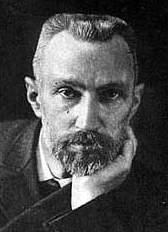Curie, Pierre (Physics & Chemistry)
Curie, Pierre
Pierre Curie (1859-1906), French physicist best known for his work with radioactivity. In 1898, Pierre Curie and his wife Marie presented evidence for the discovery of an additional, very active substance that behaved chemically almost like pure barium. They suggested the name 'radium' for the new element, and henceforth were identified with the discovery of radiation. For this discovery, the Curies were awarded the Nobel Prize in physics in 1903, which they shared with Henri Becquerel. Pierre also discovered the effect of temperature on paramagnetism, which is now known as Curie's law. Moreover, he proved that ferromagnetic substances exhibited a critical temperature transition, above which the substances lost their ferromagnetic behavior; this is now known as the Curie point. With his brother Jacques, he discovered the piezoelectric effect, through which crystals acquire a charge when compressed, twisted, or distorted. The curie is a unit of radioactivity (3.7 x 1010 decays per second or 37 gigabecquerels) originally named in honor of Pierre Curie by the Radiology Congress in 1910.
Further Reading
- American Institute of Physics, Center for History of Physics. Marie Curie and the Science of Radioactivity: Pierre Curie.
- Nobel Foundation. Marie and Pierre Curie and the Discovery of Polonium and Radium.
- Nobel Foundation. Pierre Curie - Biography.
